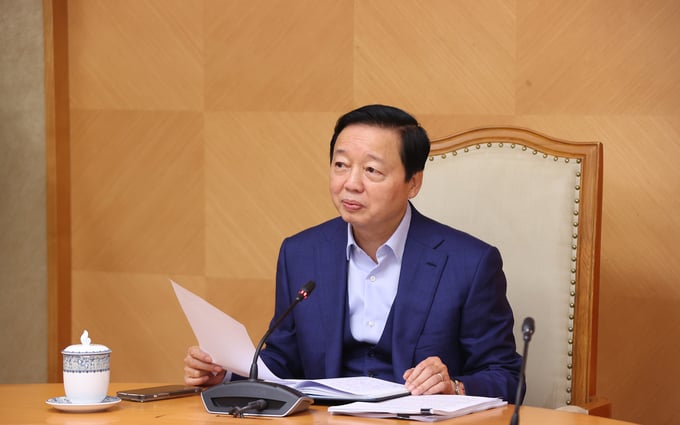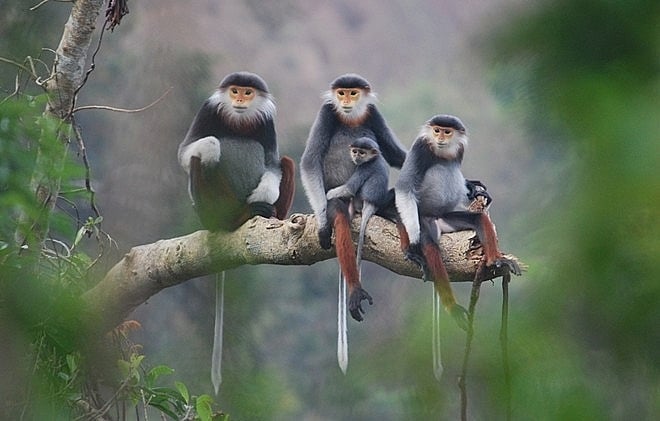May 24, 2025 | 16:20 GMT +7
May 24, 2025 | 16:20 GMT +7
Hotline: 0913.378.918
May 24, 2025 | 16:20 GMT +7
Hotline: 0913.378.918

Deputy Prime Minister Tran Hong Ha chaired the meeting to amend Decree 06. Photo: VGP.
On the morning of February 17, Deputy Prime Minister Tran Hong Ha chaired a meeting to review and provide feedback on the draft amendment to Decree 06/2019/ND-CP on the management of endangered, precious, and rare wild plants and animals, as well as the implementation of the Convention on International Trade in Endangered Species of Wild Fauna and Flora (CITES).
The meeting was attended by Deputy Minister of Agriculture and Rural Development Nguyen Quoc Tri and the drafting agency - CITES Vietnam (based at the Forest Protection Department, Ministry of Agriculture and Rural Development).
The draft Decree consists of 5 chapters and 28 articles, inheriting the provisions of Decree 06 on: Protection, investigation, assessment of the current situation, and scientific research on endangered, precious, and rare forest plants and animals; breeding of common forest animals; conditions for breeding, planting, and issuing codes for breeding and planting facilities for species listed in the CITES Appendix; conditions for export, re-export, import, and the procedures for issuing CITES permits and certificates for species listed in the CITES Appendices.
The draft also updates changes in the international CITES Convention, strengthens decentralization, simplifies administrative procedures, ensures transparency, facilitates conditions for the people and businesses, ensures consistency with other relevant laws, addresses existing issues in the implementation process, and inherits and supplements the strengths and suitable contents from previously issued decrees.
Additionally, it adds criteria for establishing the list of endangered, precious, and rare wild species in Vietnam, stipulates procedures for harvesting CITES-listed specimens from the wild and from breeding and planting, regulations on the renewal and replacement of breeding facility codes, exceptions for CITES permits and certificates, and regulations on issuing substitute or canceled CITES permits. It also addresses trade with non-CITES member countries and outlines the responsibilities of agencies in managing activities related to harvesting, breeding, planting, and the export and import of specimens listed in the CITES Appendices.
The draft also amends 7 provisions compared to Decree 06, including: the regulation of not issuing CITES import permits for aquatic species in Appendix II and I from registered breeding facilities as these species are already managed under fisheries law.
It also specifies conditions for the export and import of animals and plants listed in the CITES Appendices; defines the processes and procedures for issuing facility codes and permits; establishes regulations on the processing, trading, transportation, advertising, displaying, and storage of CITES-listed species; regulates the handling of seized specimens of CITES-listed species; and outlines the functions and responsibilities of CITES Vietnam and the scientific CITES agency in Vietnam. It also addresses the publication of the CITES species list following each CITES member meeting.

Vietnam is among the top 20 countries with the highest biodiversity in the world. Photo: VGP.
CITES Vietnam assessed that, although it is a country with high biodiversity, including many endangered, precious, and rare forest plants and animals, Vietnam is also significantly affected by illegal wildlife trade. Many wildlife specimens traded illegally come from abroad, such as elephants, tigers, rhinoceroses, and pangolins.
Since the issuance of Decree 06/2019/ND-CP, the government has amended it once, with Decree 84/2021/ND-CP.
However, during the implementation process, localities still face difficulties in several issues such as: conditions for breeding, processing, and trading of wildlife; lack of consensus on the list of endangered, precious, and rare wildlife species to be prioritized for protection; and the absence of technical standards or guidelines for wildlife enclosures and biosafety measures in breeding.
To address these issues and promote decentralization in management, Deputy Prime Minister Tran Hong Ha required the drafting agency to avoid legal gaps or overlaps, enhance administrative procedure reform, and strengthen the application of digital transformation.
The government leadership directed that the contents of the new Decree must be highly practical, including both administrative and even criminal measures to tackle the root causes of wildlife exploitation, trade, and use of endangered, precious, and rare species.
Additionally, it is necessary to include measures to change public awareness, enhance communication, and educate people, starting from schools, about the exploitation, trade, and use of endangered, precious, and rare wildlife; and to implement post-check mechanisms.
With the spirit of "identify violations and address them immediately", the Deputy Prime Minister emphasized: "The Decree must reduce both the supply and demand for endangered, precious, and rare wildlife, with the aim of controlling, managing, and stopping this situation".
He also noted that the protection and conservation of endangered, precious, and rare wildlife should be linked to sustainable exploitation, maximizing the economic value of biodiversity resources, and creating livelihoods for local people.
Regarding the investigation, research, and assessment of biodiversity resources nationwide, Deputy Prime Minister Tran Hong Ha instructed clear regulations on the lead agency responsible for publishing data, aiming to build a map and track biodiversity resource fluctuations in Vietnam.
According to the 2015 Penal Code, as amended and supplemented in 2017, individuals involved in the illegal trade of endangered wildlife may be prosecuted and sentenced to imprisonment if their activities involve large-scale trade or transportation, causing particularly serious consequences.
Translated by Kieu Chi

(VAN) The mutual export of agrifood products between the European Union (EU) and the United Kingdom (UK) must occur again without certification, border controls or other red tape. This was agreed at the UK-EU summit.
/2025/05/22/5121-2-173645_677.jpg)
(VAN) NBSAP Tracker identifies strengths and areas for improvement in the National Biodiversity Strategy, based on each region’s priorities and capacities.

(VAN) The draft amendment to the Circular on rice export trading stipulates a periodic reporting regime for rice exporting enterprises.

(VAN) Dong Thap farmers attained an average profit margin of 64% during the summer-autumn 2024 crop (first season), while An Giang and Kien Giang farmers followed with 56% and 54%, respectively.

(VAN) As a doctoral student doing research on renewable energy and electrification at Harvard University, the author shares his musings on electricity, nature, and countryside memories.

(VAN) The decree on Extended Producer Responsibility (EPR) ensures transparent management and disbursement of support funds, avoiding the creation of a “give-and-take” mechanism.

(VAN) Hue City rigorously enforces regulations regarding marine fishing and resource exploitation, with a particular emphasis on the monitoring of fishing vessels to prevent illegal, unreported, and unregulated (IUU) fishing.